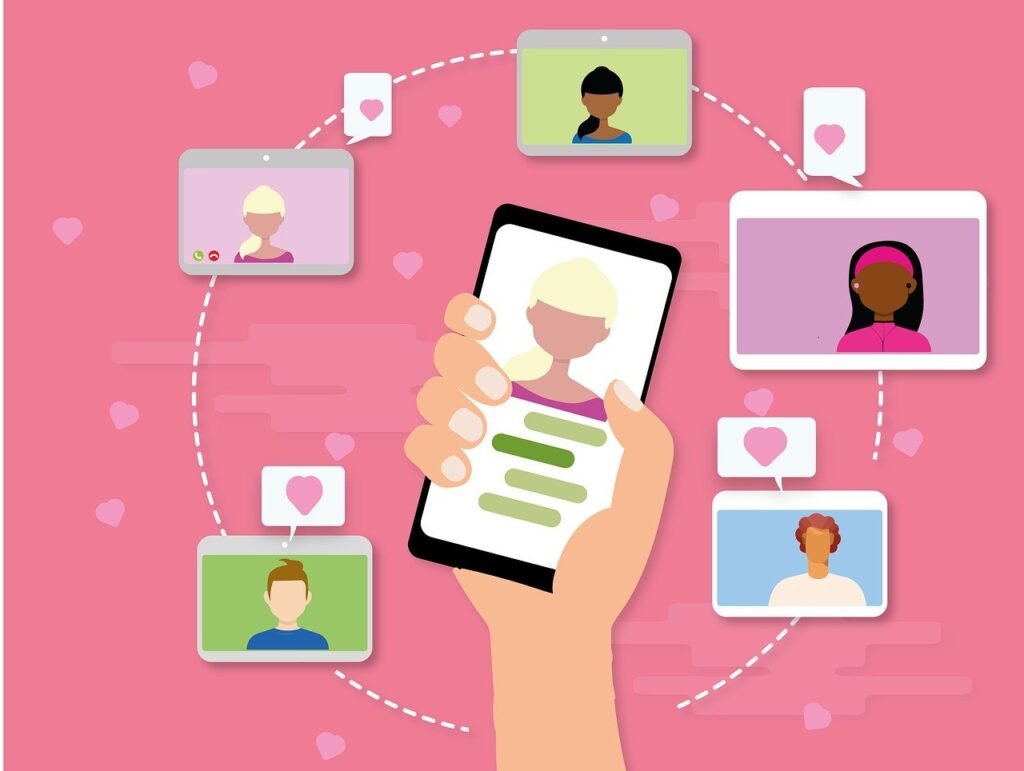- 1. What is the ROI of Email Marketing Compared to Social Media Marketing?
- 2. How Does Social Media Marketing Impact Website Traffic?
- 3. How Popular is Email Marketing for Content Distribution?
- 4. How Do Social Media Users Interact with Brands?
- 5. How Effective are Personalized Email Campaigns?
- 6. How Effective is Social Media Marketing for Businesses?
- 7. How Does Email Marketing Influence Customer Retention?
- 8. What is the Projected Spending on Social Media Advertising in 2024?
- 9. How Does Email Marketing Compare to Other Channels in Terms of ROI?
- 10. How Do Consumers Use Social Media for Product Research?
- 11. How Do Automated Emails Compare to Non-Automated Emails in Revenue Generation?
- 12. Why Do Consumers Follow Brands on Social Media?
- 13. How Important is Email Marketing for Customer Acquisition?
- 14. How Does Visual Content Impact Social Media Engagement?
- 15. What Drives Email Open Rates?
- 16. How Important is Social Media for Customer Experience?
- 17. How Do Consumers Prefer to Receive Promotional Messages?
- 18. How Does Social Media Customer Service Influence Brand Advocacy?
- 19. How Effective is Email Marketing at Acquiring New Customers Compared to Social Media?
- 20. How Does Social Media Marketing Help Reduce Marketing Costs?
- 21. How Do Transactional Emails Compare to Other Types of Emails in Engagement?
- 22. How Does Social Media Marketing Influence Lead Generation?
- 23. How Has Email Engagement Changed Over the Last Year?
- 24. How Much Time Do Users Spend on Social Media Daily?
- 25. When Do People Check Their Email?
- 26. How Do Marketers Use Paid Ads on Social Media?
- 27. How Popular is Mobile Email?
- 28. What Are Consumer Expectations for Social Media Response Times?
- 29. What is the Future of Email Marketing for Lead Generation?
- 30. How Does Video Content Perform on Social Media?
- We got all the latest Marketing Stats here:
In the ever-evolving digital landscape, marketers are continually seeking the most effective ways to reach their audience and drive conversions. Two of the most powerful tools in a marketer’s arsenal are email marketing and social media marketing. Both channels offer unique advantages and opportunities, but they also come with their own set of challenges. As we look ahead to 2024, understanding the key statistics and trends in these marketing strategies can help businesses make informed decisions and optimize their marketing efforts. This article will dive into the critical statistics that highlight the effectiveness of email marketing and social media marketing, providing insights to guide your strategy.
1. What is the ROI of Email Marketing Compared to Social Media Marketing?

The ROI of Email Marketing
Email marketing boasts an impressive average ROI of $42 for every $1 spent. This statistic underscores the efficiency and cost-effectiveness of email marketing. By allowing businesses to directly reach their audience with personalized messages, email marketing can drive significant returns on investment, making it a crucial component of any marketing strategy.
Actionable Insights
To maximize ROI from email marketing, focus on building a high-quality email list and segmenting your audience to send personalized and relevant content. Utilize automation to streamline your campaigns and track performance metrics to continuously optimize your strategy.
2. How Does Social Media Marketing Impact Website Traffic?
Increasing Website Traffic with Social Media
75% of marketers say social media marketing has increased their website traffic. Social media platforms provide a vast audience and the ability to share content that drives users back to your website. By engaging with followers and sharing valuable content, businesses can significantly boost their website traffic through social media marketing.
Actionable Insights
To leverage social media for website traffic, create engaging and shareable content that links back to your site. Use compelling visuals and clear calls to action to encourage clicks. Regularly analyze your social media performance to understand which types of content drive the most traffic and adjust your strategy accordingly.
3. How Popular is Email Marketing for Content Distribution?
Email Marketing for Content Distribution
87% of marketers use email marketing to distribute content organically. Email remains a reliable channel for sharing content directly with your audience. It allows for targeted distribution and ensures that your message reaches those most likely to engage with it.
Actionable Insights
To effectively distribute content via email, create a content calendar and schedule regular email updates. Personalize your emails based on subscriber preferences and behaviors. Track open and click-through rates to measure engagement and refine your content strategy.
4. How Do Social Media Users Interact with Brands?
Brand Interaction on Social Media
90% of social media users have already connected with a brand or business on their chosen platform. Social media provides a unique opportunity for businesses to build relationships with their audience through direct interaction. Users follow brands for updates, promotions, and to engage in conversations.
Actionable Insights
To foster brand interaction on social media, maintain an active presence and regularly engage with your audience. Respond to comments and messages promptly, and create interactive content such as polls, quizzes, and live videos to encourage participation.
5. How Effective are Personalized Email Campaigns?
The Impact of Personalization in Email Marketing
Personalized email campaigns improve click-through rates by 14% and conversion rates by 10%. Personalization helps create a more relevant and engaging experience for recipients, increasing the likelihood of them taking the desired action.
Actionable Insights
To enhance personalization in your email campaigns, collect and analyze data on subscriber preferences and behaviors. Use this information to tailor your content, offers, and recommendations. Implement dynamic content and personalized subject lines to increase engagement.
6. How Effective is Social Media Marketing for Businesses?
Effectiveness of Social Media Marketing
73% of marketers believe that social media marketing has been “somewhat effective” or “very effective” for their business. Social media platforms offer diverse opportunities to reach and engage with a broad audience, making them an essential part of many marketing strategies.
Actionable Insights
To maximize the effectiveness of your social media marketing, develop a clear strategy with defined goals. Regularly post engaging content, interact with your audience, and use analytics to track performance and refine your approach.
7. How Does Email Marketing Influence Customer Retention?
Email Marketing and Customer Retention
80% of business professionals believe that email marketing increases customer retention. Regular email communication helps maintain relationships with customers, keeping them informed and engaged with your brand.
Actionable Insights
To boost customer retention through email marketing, send regular updates, personalized offers, and exclusive content to your subscribers. Implement a loyalty program that rewards repeat customers and encourages ongoing engagement.
8. What is the Projected Spending on Social Media Advertising in 2024?
Growth in Social Media Advertising Spend
Social media advertising spend is expected to reach over $200 billion in 2024. The increasing investment in social media advertising highlights its importance as a key channel for reaching and engaging with audiences.
Actionable Insights
To make the most of your social media advertising budget, focus on targeted ads that reach your ideal audience. Use advanced targeting options to narrow down your audience based on demographics, interests, and behaviors. Continuously monitor ad performance and adjust your campaigns to optimize results.
9. How Does Email Marketing Compare to Other Channels in Terms of ROI?
Email Marketing’s Dominant ROI
59% of marketers say email is their biggest source of ROI. Email marketing’s ability to deliver targeted, personalized messages directly to a highly engaged audience makes it one of the most effective channels for driving returns.
Actionable Insights
To maximize ROI from email marketing, focus on building a quality email list through ethical means, such as opt-ins and lead magnets. Segment your audience and personalize your messages to ensure relevance. Use A/B testing to refine your email content and improve performance.
10. How Do Consumers Use Social Media for Product Research?

Social Media as a Research Tool
54% of social browsers use social media to research products. Social media platforms provide a wealth of information and reviews, making them a valuable resource for consumers looking to learn more about products before making a purchase.
Actionable Insights
To leverage social media for product research, create informative and engaging content that highlights the features and benefits of your products. Encourage satisfied customers to leave reviews and share their experiences. Use social proof, such as testimonials and user-generated content, to build trust with potential buyers.
11. How Do Automated Emails Compare to Non-Automated Emails in Revenue Generation?
Revenue from Automated Emails
Automated emails can generate 320% more revenue than non-automated emails. Automation allows for timely and relevant messages based on customer actions and behaviors, leading to higher engagement and conversions.
Actionable Insights
To maximize the revenue potential of automated emails, set up triggers for key actions such as sign-ups, purchases, and cart abandonments. Personalize your automated emails to ensure they are relevant to the recipient. Monitor the performance of your automated campaigns and make adjustments to improve effectiveness.
12. Why Do Consumers Follow Brands on Social Media?
Reasons for Following Brands
50% of consumers say they follow brands on social media to learn about new products or services. Social media provides a platform for businesses to share updates, promotions, and new offerings with their audience, keeping them informed and engaged.
Actionable Insights
To attract and retain followers on social media, regularly share updates about new products, services, and promotions. Create engaging content that highlights the benefits of your offerings and encourages interaction. Use social media to build anticipation for upcoming launches and events.
13. How Important is Email Marketing for Customer Acquisition?
Email Marketing for Acquisition
81% of small and medium-sized businesses rely on email as their primary customer acquisition channel. Email marketing’s ability to reach a targeted audience with personalized messages makes it a powerful tool for acquiring new customers.
Actionable Insights
To use email marketing for customer acquisition, create compelling lead magnets such as eBooks, webinars, or discounts to attract new subscribers. Use targeted campaigns to nurture leads and move them through the sales funnel. Track and analyze your campaigns to identify what works best for acquiring new customers.
14. How Does Visual Content Impact Social Media Engagement?
The Power of Visual Content
Social media posts with images produce 650% higher engagement than text-only posts. Visual content captures attention and encourages interaction, making it a key component of effective social media marketing.
Actionable Insights
To boost engagement on social media, use high-quality images, videos, and graphics in your posts. Create visually appealing content that tells a story and resonates with your audience. Experiment with different types of visual content to see what drives the most engagement and adjust your strategy accordingly.
15. What Drives Email Open Rates?
The Importance of Subject Lines
64% of consumers open an email based on the subject line alone. A compelling subject line can significantly impact the success of your email campaigns, influencing whether recipients choose to open your emails.
Actionable Insights
To improve your email open rates, craft subject lines that are clear, concise, and intriguing. Use personalization, such as including the recipient’s name, to make your subject lines more relevant. Test different subject lines to see what resonates best with your audience and optimize based on performance.

16. How Important is Social Media for Customer Experience?
Social Media and Customer Experience
80% of companies say that social media is an important channel for delivering exceptional customer experiences. Social media allows businesses to interact directly with customers, providing support, answering questions, and resolving issues in real-time.
Actionable Insights
To enhance customer experience on social media, ensure you have a dedicated team to monitor and respond to customer inquiries and comments. Use social media to proactively engage with your audience and address any concerns. Provide timely and helpful responses to build trust and loyalty with your customers.
17. How Do Consumers Prefer to Receive Promotional Messages?
Preference for Email
77% of consumers prefer to get permission-based promotional messages via email. Email marketing allows businesses to deliver personalized and relevant promotions directly to their audience, leading to higher engagement and conversions.
Actionable Insights
To respect consumer preferences, focus on building an opt-in email list and send permission-based promotional messages. Personalize your promotions to ensure they are relevant to the recipient. Track engagement metrics to understand what types of promotions resonate best with your audience and refine your strategy accordingly.
18. How Does Social Media Customer Service Influence Brand Advocacy?
Impact of Social Media Customer Service
71% of consumers who have had a good social media service experience with a brand are likely to recommend it to others. Providing excellent customer service on social media can turn satisfied customers into brand advocates, driving word-of-mouth marketing.
Actionable Insights
To provide exceptional customer service on social media, ensure your team is trained to handle inquiries and resolve issues promptly. Use social media monitoring tools to stay on top of mentions and comments. Encourage satisfied customers to share their positive experiences and testimonials.
19. How Effective is Email Marketing at Acquiring New Customers Compared to Social Media?
Email Marketing vs. Social Media for Customer Acquisition
Email marketing is 40 times more effective at acquiring new customers than Facebook and Twitter combined. Email allows for targeted and personalized communication, making it a powerful tool for driving customer acquisition.
Actionable Insights
To maximize customer acquisition through email marketing, focus on building a quality email list through lead generation strategies such as content offers and sign-up forms. Personalize your emails to address the specific needs and interests of your audience. Use segmentation and automation to deliver timely and relevant messages that encourage conversions.
20. How Does Social Media Marketing Help Reduce Marketing Costs?

Cost-Effectiveness of Social Media Marketing
45% of marketers report that social media marketing results in reduced marketing costs. Social media platforms offer cost-effective advertising options and organic reach opportunities, helping businesses maximize their marketing budgets.
Actionable Insights
To reduce marketing costs with social media, leverage organic reach by creating engaging and shareable content. Use targeted ads to reach specific audience segments without overspending. Track your ad performance and adjust your campaigns to optimize cost-effectiveness.
21. How Do Transactional Emails Compare to Other Types of Emails in Engagement?
Engagement from Transactional Emails
Transactional emails have 8x more opens and clicks than any other type of email and can generate 6x more revenue. These emails are triggered by specific user actions, making them highly relevant and engaging.
Actionable Insights
To maximize the effectiveness of transactional emails, personalize them to reflect the recipient’s actions and preferences. Include relevant product recommendations and cross-sell opportunities. Ensure your transactional emails are timely and provide value to the recipient.
22. How Does Social Media Marketing Influence Lead Generation?
Social Media and Lead Generation
67% of marketers say that social media marketing helps them improve lead generation. Social media platforms provide opportunities to reach and engage with potential leads, driving them to take action.
Actionable Insights
To enhance lead generation through social media, create compelling calls to action and lead magnets that encourage users to share their contact information. Use social media ads to target specific audience segments and drive traffic to your landing pages. Engage with your audience through interactive content and build relationships that lead to conversions.
23. How Has Email Engagement Changed Over the Last Year?
Trends in Email Engagement
78% of marketers have seen an increase in email engagement over the last 12 months. Email remains a highly effective channel for reaching and engaging with audiences, driving significant engagement and conversions.
Actionable Insights
To maintain and increase email engagement, focus on delivering valuable and relevant content to your subscribers. Personalize your emails based on subscriber preferences and behaviors. Continuously test and optimize your email campaigns to improve performance.
24. How Much Time Do Users Spend on Social Media Daily?
Daily Social Media Usage
Social media users spend an average of 2 hours and 24 minutes per day on social networks. This significant amount of time provides ample opportunities for businesses to reach and engage with their audience on social media platforms.
Actionable Insights
To capture the attention of social media users, post regularly and at times when your audience is most active. Use engaging content formats such as videos, live streams, and stories to keep users interested. Monitor your social media analytics to understand what types of content perform best and adjust your strategy accordingly.
25. When Do People Check Their Email?
Email Checking Habits
58% of people check their email first thing in the morning. Email remains a critical communication channel, with many people prioritizing it as part of their daily routine.
Actionable Insights
To maximize the impact of your email campaigns, schedule your emails to arrive in the morning when recipients are most likely to check their inboxes. Use clear and compelling subject lines to capture their attention and encourage them to open your email. Track your open rates and adjust your sending times based on performance.
26. How Do Marketers Use Paid Ads on Social Media?

Paid Ads in Social Media Marketing
69% of social media marketers use paid ads to boost their content. Paid social media advertising allows businesses to reach a larger audience and drive targeted traffic to their content and offers.
Actionable Insights
To make the most of paid social media ads, start by defining your target audience and campaign goals. Use advanced targeting options to reach specific demographics and interests. Create visually appealing and engaging ad content with clear calls to action. Monitor your ad performance and make adjustments to optimize results.
27. How Popular is Mobile Email?
The Rise of Mobile Email
49% of all emails are opened on mobile devices. Mobile email usage continues to grow, making it essential for businesses to optimize their email campaigns for mobile viewing.
Actionable Insights
To ensure your emails are mobile-friendly, use responsive design that adapts to different screen sizes. Keep your email content concise and easy to read on smaller screens. Test your emails on various devices to ensure they look and function well on mobile. Use clear and prominent calls to action that are easy to tap.
28. What Are Consumer Expectations for Social Media Response Times?
Response Times on Social Media
72% of consumers expect brands to respond to social media messages within 24 hours. Prompt and responsive customer service on social media is crucial for meeting consumer expectations and building trust.
Actionable Insights
To meet consumer expectations for social media response times, ensure your customer service team is equipped to monitor and respond to messages promptly. Use social media management tools to streamline your response process and track response times. Set clear guidelines for handling inquiries and issues to ensure consistent and timely responses.
29. What is the Future of Email Marketing for Lead Generation?
Email Marketing for Future Lead Generation
60% of marketers believe that email marketing will remain the most effective channel for generating leads in 2024. Email continues to be a reliable and powerful tool for reaching and engaging potential leads.
Actionable Insights
To continue generating leads through email marketing, focus on building and maintaining a high-quality email list. Use lead generation strategies such as gated content, webinars, and sign-up forms to attract new subscribers. Segment your email list and personalize your campaigns to ensure relevance and engagement. Track your lead generation metrics and adjust your strategy based on performance.
30. How Does Video Content Perform on Social Media?
The Impact of Video Content
Video content is the most engaging type of social media content, generating 1200% more shares than text and image content combined. Videos capture attention and encourage interaction, making them a powerful tool for social media marketing.
Actionable Insights
To leverage video content on social media, create high-quality and engaging videos that resonate with your audience. Use storytelling and visuals to convey your message effectively. Experiment with different types of video content, such as tutorials, behind-the-scenes footage, and live streams, to see what drives the most engagement. Promote your videos across your social media channels and encourage your audience to share them.
We got all the latest Marketing Stats here:
Read Next
- SEO for Culinary Tourism: A Guide
- SEO for Business Hotels: Targeting the Corporate Traveler
- SEO Strategies for Cruise Operators
- SEO for Adventure Travel Companies
- How to Optimize for Different Travel Seasons Globally





















Comments are closed.